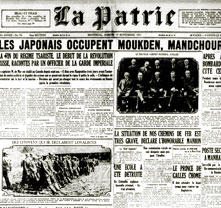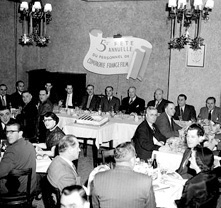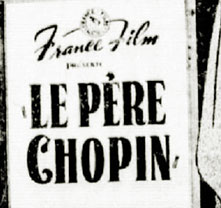France Film
-

La Patrie, Saturday 19 September 1931, p. 1.
Source : Bibliothèque et Archives nationales du Québec
-

France Films employees celebrating the fifth anniversary of the company.
Source : Cinémathèque québécoise, 1998.2116.PH.4225
-

La Patrie, 21 April 1945, p.39
Source : Bibliothèque et Archives nationale du Québec
Distribution first
In 1930, Robert Hurel founded the
Compagnie cinématographique canadienne (France-Film) with the purpose
of distributing French cinema in Canada. Initially, on 23 August of
that year, he announced the distribution of some thirty French films.
Joseph Cardinal, who rented the Théâtre Saint-Denis in Montreal,
benefited greatly from these new films. Two weeks after Hurel’s
announcement, to accompany the screening of Robert Florey’s La route est belle,
the Saint-Denis presented a filmed interview with the government
minister Athanase David with a view to promoting the distribution of
French cinema in Quebec by France-Film.
And then a chain of movie theatres
Hurley, however, did
not wish to restrict France-Film to film distribution. In February
1931, he purchased the Roxy cinema on Ste. Catherine St. West in
Montreal, renaming it the Cinéma de Paris. Soon there would also be a
Cinéma de Paris in Trois-Rivières, Quebec City and Sherbrooke. This was
the embryo of a chain that would continue to grow over the years. Hurel
also hired the journalist Henri Letondal to implement the best possible
advertising strategies.
To promote the growth of his chain, Hurel decided to organise a “French
talking film congress” on 29 July 1931 to bring his exhibitors together
and put them in touch with various French-Canadian public figures,
including Pamphile-Réal Du Tremblay, head of the newspaper La Presse.
At the closing banquet, the French consul-general, presiding over the
event, remarked: “Exhibitors of French films should tell themselves
that by distributing French-language films in this province they are
carrying out a patriotic act. They are using a brilliant weapon to
battle the overrunning of the popular classes by Americanism”. Hurel
was already celebrating the fact that forty-five movie theatres
throughout Quebec were regularly screening the films he supplied. These
congresses were held until 1936.
Towards a monopoly
By
early 1934, with the help of a major investment from Alban Janin, a
rich construction entrepreneur, the company had grown. This enabled
Hurel, in September of that year, to take over J.A. DeSève’s
Franco-Canada films. France-Film now held a virtual monopoly in the
distribution of French-language cinema.
France-Film’s success was not seriously jeopardised by the war.
Although the company lacked films for its theatres and some of them
were forced to close, those which also offered vaudeville shows and
melodrama (such as the Arcade and the Théâtre National) had no shortage
of customers. The Saint-Denis offered concerts in its down times. The
end of the war brought with it a return to prosperity, because European
film production had not come to a halt and there were many new films to
distribute.
J.A. DeSève took over as owner of France-Film in 1948. In the early
1950s he had secured the distribution rights to all Quebec film
production, and the company made huge profits, made even greater by the
fact that these films were shown in its own movie theatres.
After experiencing some ups and downs, France-Film continued to advance
until the mid-1970s, when it was run by Georges Arpin. In the 1980s it
sold its movie theatres, with the exception of the Saint-Denis. Its
other activities were taken over by its subsidiary Les films Équinoxe.